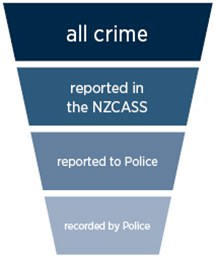Reporting crime
- What can the NZCASS tell us about reported crime?
- How much crime is reported to Police?
- What types of crime are reported to Police?
- Who is more or less likely to report to Police?
- Why don’t people report crime to Police?
- How does NZCASS crime compare to Police offence statistics?
What can the NZCASS tell us about reported crime?
To understand reporting behaviour, we look at five things:
- how much crime is reported to Police (according to victims)
- what types of crime are reported or not reported to Police
- who is more or less likely to report crime to Police
- why adults report or don’t report crime to Police
- how much crime is recorded in Police statistics.

‘Reported crime’ includes incidents where the victim or a member of the victim’s household reported the incident to Police, or where the victim knew that the Police had found out about the incident in some way.
How much crime is reported to Police?
In 2013, 31% of all crime was reported to Police. There have been no statistically significant changes in the percentage of crime reported to Police since 2005 or 2008.
What types of crime are reported to Police?
In 2013, more household offences (38%) were reported to Police than personal offences (24%). These percentages are in line with previous years with no statistically significant changes over time.
Just under a quarter (24%) of all violent interpersonal offences were reported to Police in 2013. We found no statistically significant change over time to the proportion of violent interpersonal offences reported to Police.
In 2013:
- 23% of violent interpersonal offences by a family member (including both current and ex-partners) were reported to Police.
- 24% of violent interpersonal offences by an intimate partner were reported to Police.
- 28% of violent interpersonal offences by someone known to the victim (who was not an intimate partner or family member) were reported to Police.
- 23% of violent interpersonal offence by a stranger were reported to Police.
Who is more or less likely to report to Police?
Crime more likely to be reported to Police in 2013 compared to the NZ average (31%) were incidents that involved victims:
- who were separated/divorced (44%)
- living in a ‘one parent with child(ren)’ household (40%)
- aged 30–39 years (38%)
Crime more likely to go unreported to Police in 2013 compared to the NZ average (68%) were incidents that involved victims:
- living in ‘other multi-person households’ (82%)
- aged 15–19 years (80%)
- living in the least deprived areas (quintile 1) (77%)
- who identified as Asian (76%)
- who indicated they would be ‘a little/quite limited’ to buy a non-essential item they wanted for $300 (75%)
- who had never been married/never in a civil union (73%)
- who were non-partnered (71%)
- living in a main urban area (70%)
Why don’t people report crime to Police?
To help us understand why people chose not to report crime to Police, we:
- looked at reporting behaviour by factors related to both the ‘offence’ and the ‘impact on the victim’
- asked victims why Police didn’t come to know about the incident.
On average, 68% of incidents in 2013 went unreported to Police.
The incidents most likely to be unreported to Police in 2013 were those:
- where the victim defined the incident as ‘just something that happens’ (90%)
- where no injury was sustained (88%) (for assaults and sexual offences only)
- where the victim was affected ‘not at all’ (84%)
- perceived as being less serious (84%)
- where the victim defined the incident as ‘wrong, but not a crime’ (84%)
- where the victim was affected ‘just a little’ (77%)
- where the offender was an intimate partner (76%)
The most common reasons overall for not reporting an incident to Police in 2013 were that it was either too trivial, there was no loss, they didn’t feel it was worth reporting, or the attempt was unsuccessful (49%).
How does NZCASS crime compare to Police offence statistics?
Some NZCASS offences are suitable to be compared with Police offence statistics. We call this a ‘comparable subset’ and it includes the following offences:
- thefts of vehicle
- thefts from vehicle or vehicle interference
- burglaries
- robberies or thefts from the person
- assaults.
About 43% of crimes collected through the NZCASS in 2013 fell into categories that could be compared with crime recorded by the New Zealand Police (the comparable subset).
See Comparing NZCASS with Police statistics for more information.
This page was last updated:
